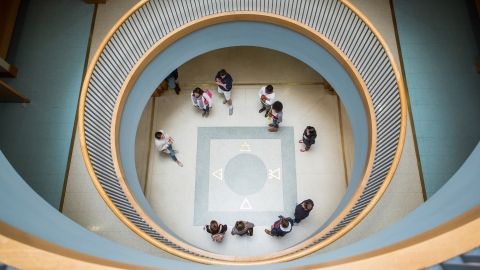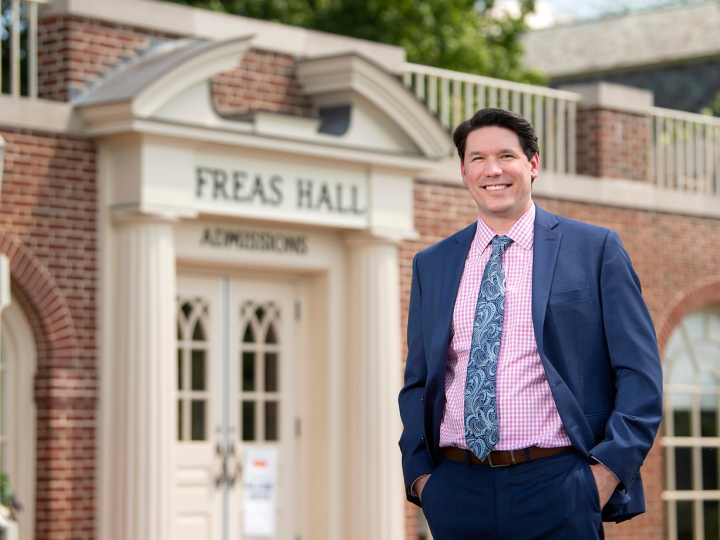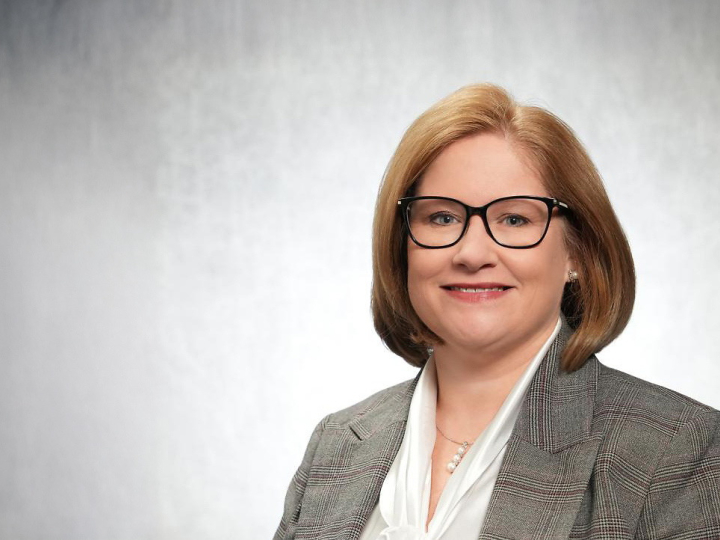
Bucknell Launches 'Dignity & Dialogue Circles' to Strengthen Community Connections
September 4, 2024
Dignity & Dialogue Circles will give members of the campus community the opportunity to engage across differences. Photo by Emily Paine, Marketing & Communications
In a continued effort to foster meaningful conversations across campus, Bucknell University is launching a new initiative called Dignity & Dialogue Circles for the 2024–2025 academic year. This program will further the University's commitment to creating a more inclusive and empathetic campus environment and respond to requests from students, staff and faculty for more opportunities to engage across differences.
Dignity & Dialogue Circles are organized opportunities for individuals across campus from diverse perspectives and backgrounds to discuss important topics. The goal is to cultivate an atmosphere where innovation, collaboration and empathy thrive.
"Creating opportunities for open conversations across campus is essential for fostering a sense of belonging and community within a university," says Jocelyne Scott ’11, director of equity and inclusive excellence. "When individuals from diverse backgrounds and perspectives come together to discuss important topics across differences, it not only broadens understanding but also strengthens the fabric of the campus culture. This inclusive dialogue helps break down barriers, promotes mutual empathy, and encourages the exchange of ideas in a way that is rooted in shared dignity."
By providing a space where all voices are heard and valued, the University ensures that everyone feels they belong, which is critical for personal and academic growth.
"We recognize that it is our responsibility to actively invest in creating a cohesive campus community rooted in a shared commitment to dignity and civil discourse so that all of our community members can thrive," says Vernese Edghill-Walden '87, vice president of equity & inclusive excellence. "We know this is a time when the need for civil dialogue is at an all-time high."
The foundation for this initiative was laid over the summer when 22 Bucknell staff and faculty members completed an intensive four-day training with Advoz, a regional center specializing in mediation and restorative practices. The training, which was co-sponsored by the Division of Equity & Inclusive Excellence and the Division of Talent, Culture, & Human Resources, consisted of two key sessions.
The first, called "conflict, communication and culture," helped participants explore conflict styles, power dynamics and empathetic listening. The second, called "the circle process," focused on the structure and goals of using circles as a method for dialogue across differences.
The circle process is rooted in the tradition of restorative or peacemaking practices that have been used in Indigenous communities. "Both the First Nations people of the Yukon and the Maori People of New Zealand have used the circle processes that undergird the models we will be using," Scott says. This approach provides a formal, structured space where participants can bring their best selves into dialogue, giving equal voice to everyone and encouraging thoughtful, respectful communication. The process is designed to slow down conversations, allowing participants to reflect on their experiences, explore connections and differences, and engage emotionally, mentally, physically and spiritually.
Participants of the circle process carry the responsibility to listen to understand rather than to respond. Unlike typical discussions or debates, the circle process is not a space for advocating a particular viewpoint. Instead, it emphasizes connection, storytelling and listening with the intent to understand. By fostering a more empathetic community, the circles help participants treat one another with dignity and respect, regardless of their ideological differences.
Throughout the fall semester, the Division of Equity & Inclusive Excellence will host a series of Dignity & Dialogue Circles. These sessions will provide proactive opportunities for members of the Bucknell community to engage in difficult but necessary conversations.
An initial session will be held on Wednesday, Sept. 11, to introduce members of the Bucknell community to the overall framework and methodology of the circle process. Following this session, five additional sessions discussing topics such as political division and maintaining civility post-election will be held. Each circle will be limited to 25 participants to ensure a focused and impactful dialogue. Advanced registration is required.
In addition to these campus-wide Dignity & Dialogue Circles, facilitators are cultivating additional opportunities for circle dialogue within their respective departments and divisions. These sessions will continue to support Bucknell’s ongoing commitment to fostering an inclusive and connected community. Those interested in getting involved can contact eie@bucknell.edu.
Beyond the Dignity & Dialogue Circles offered by the Division of Equity & Inclusive Excellence, the Office of the Provost and Student Affairs are dedicated to providing many different opportunities to engage the Bucknell community in efforts to advance a culture of dignity and build a culture of respect.
"In this election year, emotions will be running high, and information will flood various platforms, making it challenging for us to parse the data saturating our social media and national news in a productive manner," says Provost Wendy Sternberg. "Our community will approach the election with diverse perspectives and needs, and we're here to offer broad support, including voter education, de-escalation training and information literacy. Throughout the semester, you'll receive information about the many different ways you can get involved. We hope that community members avail themselves of the opportunities that serve their interests as we all work toward the common goal of creating a more cohesive campus community rooted in shared dignity and civil discourse."

